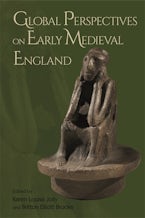
Humour in Anglo-Saxon Literature
- Description
- Contents
- Reviews
Essays lay the groundwork for a theory of humour in Old English literature.
Humour is rarely seen to raise its indecorous head in the surviving corpus of Old English literature, yet the value of reading that literature with an eye to humour proves considerable when the right questions are asked. Humourin Anglo-Saxon Literature provides the first book-length treatment of the subject. In all new essays, eight scholars employ different approaches to explore humor in such works as Beowulf and The Battle of Maldon, the riddles of the Exeter Book, and Old English saints' lives. An introductory essay provides a survey of the field, while individual essays push towards a distinctive theory of Anglo-Saxon humour. Through its unusual focus, this collection will provide an appealing introduction to both famous and lesser-known works for those new to Old English literature, while those familiar with the usual contours of Old English literary criticism will find here the value of a fresh approach.
Contributors: JOHN D. NILES, T.A. SHIPPEY, RAYMOND P. TRIPP JR, E.L. RISDEN, D.K. SMITH, NINA RULON-MILLER, SHARI HORNER, HUGH MAGENNIS.
JONATHAN WILCOX is Associate Professor of English at the University of Iowa and editor of the Old English Newsletter. Although the question of humour in the surviving corpus of Old English literature has rarely been discussed, the potential for analyzing this literature in terms of its humor is in fact considerable. In the essays especially commissioned for this volume, the first book-length treatment of Anglo-Saxon humor, eight of the foremost scholars in the field use different approaches to explore humor in the surviving literature of Anglo-Saxon England, in such works as Beowulf and The Battle of Maldon, the riddles of the Exeter book, and Old English saints' lives. The articles are prefaced with an introduction surveying the field. Through its unusual focus, this collection will provide an appealing introduction to both famous and lesser-known works for those new to Old English literature, while those familiar with theusual contours of Old English literary criticism will find here the value of a fresh approach. JONATHAN WILCOX is Associate Professor of English at the University of Iowa and editor of the Old English Newsletter.
Humour is rarely seen to raise its indecorous head in the surviving corpus of Old English literature, yet the value of reading that literature with an eye to humour proves considerable when the right questions are asked. Humourin Anglo-Saxon Literature provides the first book-length treatment of the subject. In all new essays, eight scholars employ different approaches to explore humor in such works as Beowulf and The Battle of Maldon, the riddles of the Exeter Book, and Old English saints' lives. An introductory essay provides a survey of the field, while individual essays push towards a distinctive theory of Anglo-Saxon humour. Through its unusual focus, this collection will provide an appealing introduction to both famous and lesser-known works for those new to Old English literature, while those familiar with the usual contours of Old English literary criticism will find here the value of a fresh approach.
Contributors: JOHN D. NILES, T.A. SHIPPEY, RAYMOND P. TRIPP JR, E.L. RISDEN, D.K. SMITH, NINA RULON-MILLER, SHARI HORNER, HUGH MAGENNIS.
JONATHAN WILCOX is Associate Professor of English at the University of Iowa and editor of the Old English Newsletter. Although the question of humour in the surviving corpus of Old English literature has rarely been discussed, the potential for analyzing this literature in terms of its humor is in fact considerable. In the essays especially commissioned for this volume, the first book-length treatment of Anglo-Saxon humor, eight of the foremost scholars in the field use different approaches to explore humor in the surviving literature of Anglo-Saxon England, in such works as Beowulf and The Battle of Maldon, the riddles of the Exeter book, and Old English saints' lives. The articles are prefaced with an introduction surveying the field. Through its unusual focus, this collection will provide an appealing introduction to both famous and lesser-known works for those new to Old English literature, while those familiar with theusual contours of Old English literary criticism will find here the value of a fresh approach. JONATHAN WILCOX is Associate Professor of English at the University of Iowa and editor of the Old English Newsletter.
Byrhtnoth's Laughter and the Poetics of Gesture - John D. Niles
'Grim Word-Play': Folly and Wisdom in Anglo-Saxon Humor - T A Shippey
Humor, Wordplay, and Semantic Resonance in Beowulf - Raymond P Tripp Jr
Heroic Humor in Beowulf - E L Risden
Humor in Hiding: Laughter Between the Sheets in the Exeter Book Riddles - D K Smith
Sexual Humor and Fettered Desire in Exeter Book Riddle 12 - Nina Rulon-Miller
'Why do you speak so much foolishness?' Gender, Humor, and Discourse in Ælfric's Lives of Saints - Shari Horner
A Funny Thing Happened on the Way to Heaven: Humorous Incongruity in Old English Saints' Lives - Hugh Magennis
'Grim Word-Play': Folly and Wisdom in Anglo-Saxon Humor - T A Shippey
Humor, Wordplay, and Semantic Resonance in Beowulf - Raymond P Tripp Jr
Heroic Humor in Beowulf - E L Risden
Humor in Hiding: Laughter Between the Sheets in the Exeter Book Riddles - D K Smith
Sexual Humor and Fettered Desire in Exeter Book Riddle 12 - Nina Rulon-Miller
'Why do you speak so much foolishness?' Gender, Humor, and Discourse in Ælfric's Lives of Saints - Shari Horner
A Funny Thing Happened on the Way to Heaven: Humorous Incongruity in Old English Saints' Lives - Hugh Magennis
"Relevant and dynamic... When taken as a whole shows that there is quite a lot of humour in the notoriusly unfunny Old English corpus, and establishes that humorous strand as an important strand of literary critical enquiry." MEDIEVAL REVIEW
"Leaves no doubt that the Anglo-Saxons enjoyed a laugh just as much as we do." SPECULUM
Hardcover
9780859915762
May 2000
£70.00 / $105.00
Ebook (EPDF)
9781846150029
May 2000
$29.95 / £24.99














